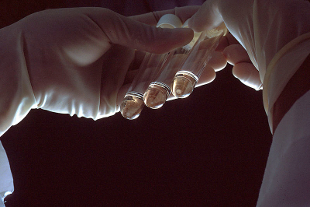 WIKIMEDIA, NCI, JOHN CRAWFORDLately the scientific community has been talking about the omnipresent problem of irreproducibility—the failure of researchers to replicate results in the published literature. This week in Nature, National Institutes of Health (NIH) Director Francis Collins and Principal Deputy Director Lawrence Tabak weighed in on this discussion, noting several ways in which the agency hopes to fix the problem.
WIKIMEDIA, NCI, JOHN CRAWFORDLately the scientific community has been talking about the omnipresent problem of irreproducibility—the failure of researchers to replicate results in the published literature. This week in Nature, National Institutes of Health (NIH) Director Francis Collins and Principal Deputy Director Lawrence Tabak weighed in on this discussion, noting several ways in which the agency hopes to fix the problem.
“Reproducibility is potentially a problem in all scientific disciplines,” the duo wrote. “[T]he checks and balances that once ensured scientific fidelity have been hobbled.”
Collins and Tabak cited poor experimental design and a scientific culture that overvalues provocative statements and high-impact publications as contributors to the problem. Misconduct, they noted, is unlikely to be a main driver. “[F]raudulent papers are vastly outnumbered by the hundreds of thousands published each year in good faith,” they wrote.
Among the suggested solutions is better training for young investigators on experimental design, with an emphasis on “frequently ignored” issues such as “blinding, randomization, replication, sample-size calculation and the effect of sex differences.” Starting later this year, such training will be mandatory for NIH intramural postdoctoral fellows, with corresponding materials ...














